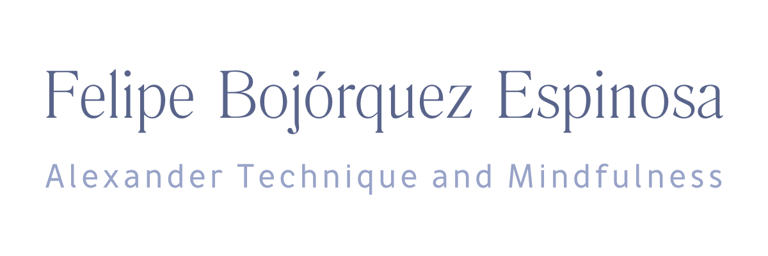The Immense Power of Practicing “Non-Doing”
ALEXANDER TECHNIQUE
Felipe Bojórquez Espinosa
The danger of chasing our goals automatically
Setting goals is an essential part of our lives. Our health, careers, personal relationships, and even our days and weeks are shaped by the goals we set and the way we pursue them. This process can happen consciously, but it can also occur subconsciously, automatically, and without much reflection.
A simple example of a valuable goal might be: “I want to be ready with my repertoire so I can play well in the exam.”
But what happens if we become obsessed with a single phrase that doesn’t come out the way we want?
If we start to feel nervous, frustrated by setbacks, or angry at people or things that seem to get in our way, we may end up doing something uncomfortable—or even harmful. In fact, when we obsess too much, we often end up hating the repertoire altogether and thinking things that damage our self-esteem.
Our once valuable goal turns into a source of stress and destructive effort, spreading consequences not only for ourselves but also for those around us.
When we make end-gaining a habit, we harm ourselves. And this chain of negative effects never stops: when we act from anxiety, our environment suffers too.
How “non-doing” transforms the way we achieve goals
Now, what happens if we change our approach? Suppose we decide to keep our goal (“to be well prepared for the exam”) but stop doing things that sabotage it. How do we do that? By letting go of the desperate pursuit.
The best way is to create some distance from that goal—and, even more importantly, from our desire to achieve it. That mental distance allows us to clarify our thoughts, maintain attention, and make more practical and constructive decisions that help us reach the goal more effectively.
Goals, objectives, and desires are both vital and fatal. They become fatal when we chase them recklessly, but they are vital when we find the right distance to pursue them in a healthy way. Paradoxically, letting go of the pursuit of a goal may be the best way to achieve it.
F. M. Alexander often spoke of the concept of “non-doing” and its fundamental importance. He proposed that when we set a goal, we should first inhibit our impulse to pursue it immediately.
Inhibiting, in this context, doesn’t mean suppressing our emotions, but rather pausing the automatic reactions that lead us to act impulsively. When we do this, we can organize our energies, see the path more clearly, and, if we still choose to proceed, act consciously.
We face the stimulus, we inhibit our reaction, and through that, we gain the ability to choose the right path. As we practice this process, we develop the skill of observing and deciding on our reactions—even in moments of pressure, like when performing a musical piece before a demanding audience.
Here, the ability to inhibit our reactions allows us to act more effectively and achieve our goals in a much healthier way.
References:
“The Alexander Technique, a skill for life,” Pedro de Alcántara
“Indirect procedures,” Pedro de Alcántara
Related articles
Well-balanced flutist
Alexander Technique and Mindfulness in everyday musical practice.
Specialized support for high-performance flutists and flute students.
© 2025. All rights reserved. Privacy policy.
Menu:
Lessons
About me
